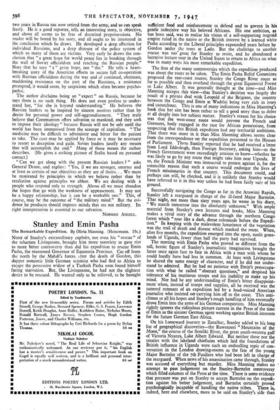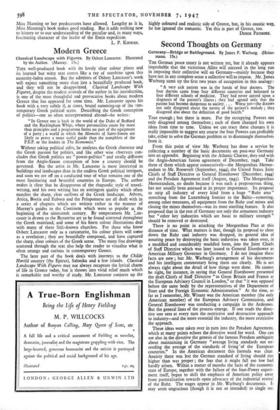Stanley and Emin Pasha
The Remarkable Expedition. By Olivia Manning. (Heinemann. 15s.) NONE of Stanley's extraordinary exploits, not even his " rescue " of the reluctant Livingstone, brought him more notoriety or gave rise to more bitter controversy than did his expedition to rescue Emin Pasha, the marooned Governor of Ecivatoria Province. Cut off from the north by the Mandi's forces s fter the death of Gordon, this dapper romantic little German scientist who had fled to Africa to escape the possessive widow of a Turkish Pasha soon found himself facing starvation. But, like Livingstone, he had not the slightest desire to be rescued. He wanted only to be relieved, to be brought sufficient food and reinforcement to defend and to govern in his gentle indecisive way his beloved Africans. His one ambition, as has been said, was to realise his vision of a self-supporting negroid empire ruled in the native or the British interest by a learned white Pasha according to the Liberal principles expounded years before by Gordon under the trees at Lado. But the challenge to another rescue was too. great for Stanley to resist, and he abandoned a lucrative lecture tour in the United States to return to Africa on what was in many ways his most remarkable expedition.
The first of the many controversies which the expedition produced was about the route to be taken. The Emin Pasha Relief Committee proposed the east-coast routes; Stanley the Congo River route as far as possible and then overland through the great Equatorial Forest to Lake Albert. It was generally thought at the time—and Miss Manning accepts this view—that Stanley's decision was largely the result of a private deal with Leopold of the Belgians, the country between the Congo and Emin at Wadelai being very rich in ivory and caoutchouc. This is one of many indications in Miss Manning's book that her aim has been rather to tell a good story than to delve at all deeply into her subject matter. Stanley's reason for his choice was that the west-coast route would prevent the French and Germans, hotly engaged in the race for African possessions, from suspecting that this British expedition had any territorial ambitions. That there was more in it than Miss Manning allows seems clear from the correspondence on the expedition presented to the Houses of Parliament. There Stanley reported that he had received a letter from Lord Iddesleigh, then Foreign Secretary, asking him—as the French Government were exceedingly anxious to know—whether he was likely to go by any route that might take him near Uganda. If so, the French Minister was instructed to protest against it, for the ostensible reason that such a course would endanger the lives of French missionaries in that country. This document could, and perhaps can still, be checked, and it is unlikely that Stanley would have referred to it in this way unless he had been fairly sure of his ground.
Successfully navigating the Congo as far as the Aruwimi Rapids, Stanley left a rearguard in charge of the ill-fated Major Barttelot. That night, not more than sixty years ago, he wrote in his diary, " We march tomorrow into the absolutely unknown." With ample material from Stanley's own lectures and books, Miss Manning makes a vivid story of the advance through the northern Congo forest which "rose like a dark, dense colonnade before the Expedi- tion." In keeping with the malevolent luxuriance of the vegetation was the trail of death and disease which marked the route. When, after five months, the expedition emerged into the open, sunlit grass- lands of Uganda, fewer than half the party had survived.
The meeting with Emin Pasha who proved so different from the tall, heroic figure of Stanley's journalistic imagination brought the latter once again face to face in Africa with a man with whom he could hardly have had less in common. At least with Livingstone he shared the same energy of character, and if he did not under- stand he admired. But he had no patience with Emin's preoccupa- tion with what he called "abstract questions," and despised his tolerance of his mutinous troops and his inability to make up his mind. Nor had he any understanding of Emin's bitter disappoint- ment when, instead of troops and supplies, all he received was the tattered remnant of an expedition led by a loud-voiced American journalist who insisted on carrying him off to the coast. This anti- climax to all his hopes and Stanley's rough handling of him eventually drove Emin into the arms of his German compatriots. Miss Manning rightly ignores the ridiculous picture current in the Press of the time of Emin as the sinister German agent working against British interests for the future German East.Africa.
On his Lomeward journey to Zanzibar, Stanley added to his long list of geographical discoveries—the Ruwenzori " Mountains of the Moon," the course of the Semliki River, the great south-western gulf of Victoria Nyanza, Lake Albert Edward. But neither these nor the treaties with the lakeland chieftains which laid the foundations of British influence in Uganda were such an enthralling topic of con- versation in the London drawing-rooms as the fate of the young Major Barttelot of the 7th Fusiliers who had been left in charge of the rearguard. When news of his assassination came through, Stanley was accused of everything but murder. Miss Manning makes no attempt to pass judgement on the Stanley-Barttelot controversy which filled columns of the Press at the time. There is some evidence that pressure was put on Stanley to accept Barttelot on the expedi- tion against his better judgement, and Barttelot certainly proved psychologically incapable of handling the native tribes. There is, indeed, here and elsewhere, more to be said on Stanley's side than
Miss Manning or her predecessors have allowed. Lengthy as it is, Miss Manning's book makes good reading. But it adds nothing new to history or to our understanding of the peculiar and, in many ways, fascinating character of the leader of the Emin expedition.
L. P. KIRWAN.



































 Previous page
Previous page